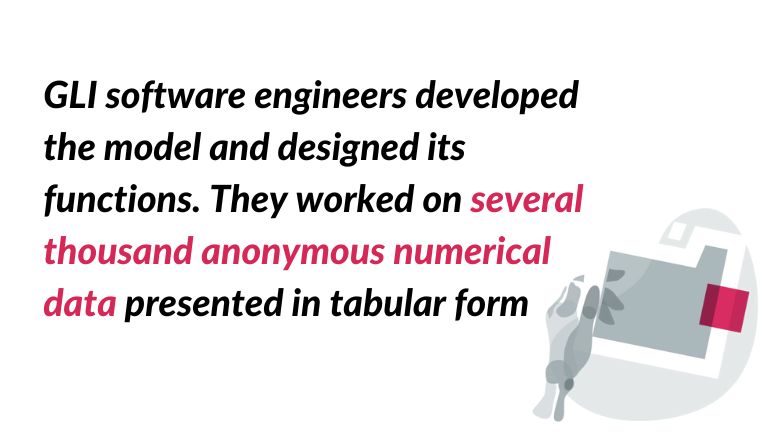Predictive analytics in medical algorithms development: the real applications

Predictive analytics in medical algorithms development has become increasingly popular in the field of software development for medicine. Among of technological advancements, predictive analytics transforms healthcare with efficient and personalized solutions.
In today’s digital age, data is abundant, but its real value lies in the insights we can derive from it. Machine learning solutions enable predictive algorithms to analyze vast data sets and forecast outcomes for patients.
Our proven experience in medical predictive algorithms development
The power of predictive analytics was used in a project carried out by Graylight Imaging for the Swiss company PIPRA. The project included the development of a predictive model on which a comprehensive, certified system in the form of a web application was to be based. The model was intended to estimate the patient’s risk of developing Post-Operative Delirium and Post-Operative Cognitive Dysfunction.
In this case, our software engineers developed the model and designed its functions. They worked on several thousand anonymous numerical data presented in tabular form. The project resulted in the development of a predictive model for data analysis and a web application based on that model. The doctor is given a score of the predicted risk of complications in the form of POSD that is related to the surgery for the patient. This allows the doctor to make an informed decision about whether the potential benefits of the surgery outweigh the risks of postoperative delirium. We would like to recommend that you read more about it in our dedicated blog post predictive algorithm for the Swiss company PIPRA.

Case studies of healthcare areas where predictive analytics has been used
Whoever said that prevention is better than cure was right. And prediction is even better than prevention. Since we live in a tech world, why not use science and technology for good? In particular, for the healthcare industry? [1]
Predictive analytics in medical algorithms development is still in progress. However, the below examples of medical applications on the market show that this feature is used in it.
Technology based on machine learning predictive algorithms has wide applications in medicine. Here are some interesting case studies:
Case 1: Early disease detection
Big data analysis makes health prediction essential in modern life. [8] Predictive analytics analyzes patient data to identify early signs of diseases. This enables doctors to intervene early, significantly improving treatment success and long-term management.
Huntsville Hospital in Alabama implemented clinical decision support systems (CDS) coupled with analytics tools for sepsis detection. The real-time disease signs monitoring allowed for early sepsis instances identification, which resulted in mortality reduction. This predictive analytics case study has been a success because of a technological approach at Huntsville Hospital. [2]
Case 2: Hospital readmission prevention
Predictive models analyze patient records to predict the likelihood of readmission. By identifying high-risk patients, healthcare providers can design targeted interventions, such as personalized follow-up care plans and remote monitoring, reducing the rate of readmissions and easing the burden on healthcare facilities.
Medicare’s Hospital Readmissions Reduction program fines those hospitals that can’t prevent unplanned readmissions to the inpatient care units. The innovation can be the right tool to maintain care coordination strategies. It can monitor the patient’s vital signs and inform the healthcare providers about the likelihood of a 30-day readmission window. [3]
Case 3: Technology for elderly care
Monitoring the health of elderly people at home using predictive analytics is another important application of healthcare technology. The elderly often have complex health conditions and are at risk of developing complications such as skin breakdown, bone fractures, high blood pressure, and strokes.
Preventative measures can vary from personal caregivers to data-driven wearables. Wearables collect health data and detect changes in vital signs before they cause adverse effects. Medical Home Network has been using AI to manage COVID-19 cases. They have been able to identify patients with respiratory problems and predict their risk during the pandemic. [4]
Case 4: Drug discovery
Predictive modeling for drug discovery is an emerging field that has the potential to revolutionize the discovery of new drugs. These models can identify promising lead compounds. The use of computational techniques is crucial for visualizing, analyzing, and predicting chemical and biological data.
The high death rate caused by malaria worldwide necessitates the development of new and highly effective drugs against Plasmodium falciparum. Challenges include resistance to first-line drugs and a lack of suitable animal models for anti-P. falciparum assays. Newer approaches in antimalarial drug discovery, including machine learning tools, have emerged with promising results. [5]
Case 5: Chronic disease management
Predictive analytics has become an integral part of chronic disease monitoring and scoring. The American Autoimmune Related Diseases Association reports that autoimmune diseases have been on the rise in the USA, affecting approximately 50 million Americans.
By mining datasets and creating disease-scoring models, insights into disease predisposition can be obtained. For autoimmune diseases, IQuity’s technology uses machine learning to analyze RNA patterns in blood samples and compares them with patterns of autoimmune disease. This innovative approach helps to identify the disease at an early stage and monitor the patient’s response to treatment. [6]
Case 6: Personalized treatment plans
Predictive analytics plays a crucial role in precision medicine, an approach to healthcare that uses an individual’s genetic, lifestyle, and environmental data to develop personalized treatment plans for individual patients. [7]
Each patient is different, and predictive analytics acknowledges this diversity. With this approach, doctors can customize treatment plans by analyzing, for example, genetic data, lifestyle as well as previous treatment responses to meet each patient’s unique needs. Personalized medicine guarantees that patients receive the most efficient treatments with minimal side effects, resulting in higher success rates and an improved quality of life.
References:
[1], [2], [3], [4], [6] Zharovskikh A.: Best Healthcare Predictive Analytics Case Studies,
https://indatalabs.com/blog/healthcare-pa-examples
[5] Toma M., Wei O. C: Predictive Modeling in Medicine, Encyclopedia 2023, 3(2), 590-601, https://doi.org/10.3390/encyclopedia3020042.
[7] Tinazil A.:
https://www.forbes.com/sites/forbestechcouncil/2023/02/21/the-crucial-role-of-predictive-analytics-in-precision-medicine